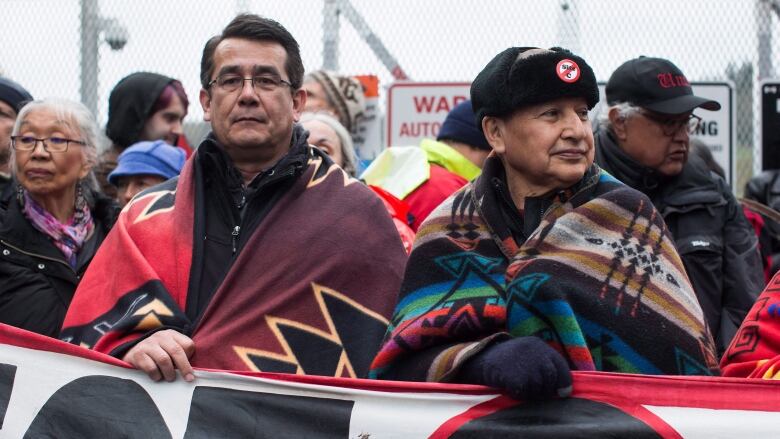Kinder Morgan Trans Mountain pipeline expansion divides Indigenous communities

As the divide thickens for politicians in B.C. and Alberta over the Kinder Morgan Trans Mountain pipeline expansion, the sentiment also resonates with First Nations in these provinces.
First Nation leaders in favour of the project argue there's an opportunity for economic prosperity for their people.
But critics warn beyond the environmental ruin, the pipeline could become Canada's own Standing Rock, an Indigenous-led protest of a controversial pipeline in the U.S. that stretched on for months.
Bob Chamberlin, vice-president of the Union of British Columbia Indian Chiefs, opposes the expansion and suggests the pipeline won't be built.
"I say that because the opposition that is present is very much committed to this," Chamberlin told The Current's guest host Laura Lynch.
- OUT IN THE OPEN | Two Indigenous people on different sides of the pipeline issue
- THE CURRENT | Is the Kinder Morgan pipeline in the 'national interest?'
He recognizes the complexity of the issue but calls it "a failing of the government" to exclude all First Nations perspectives in the discussion.
"This is going to happen again on a different project if the government does not act meaningfully to let ... the government receive First Nations' place in the governance of this country and the territories," Chamberlin said.
He argues every First Nation wants industry, "but it has to be one that's consistent with their principles and values and vision that they have for their title land, not to be imposed by the government and certainly, not to be imposed by some company from Texas."
Steven Buffalo, president and CEO of the Indian Resource Council, which represents oil and gas-producing Indigenous nations, agrees the approach taken by government, proponents and industry has been "backwards" and needs to change.
But he said he's optimistic about the opportunity the pipeline offers for Indigenous people.
"Not only oil and gas producing communities but for all of the communities in Canada if we can find some resolve here."

Buffalo told Lynch he sees the pipeline expansion as a way to keep communities viable.
"Canada has failed tremendously with our contribution agreements that we get for programming, so we have to find a different way of sustainability," he explained, pointing to the oil and gas industry providing subsidizing for programs and sufficient housing.
He said the extra revenue coming to the community has resulted in jobs and specific training.
"We've seen First Nations communities … and entrepreneurs really step forward and take advantage and prosper and really, the results are coming back to the community."
Listen to the full conversation at the top of this page, which includes a lawyer that specializes in Indigenous rights who suggests the pipeline won't get built due to the legal challenges.
This segment was produced by The Current's Ines Colabrese, Samira Mohyeddin and Danielle Carr.